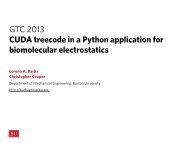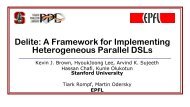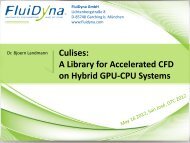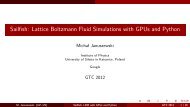DirectCompute Optimizations and Best Practices - Nvidia
DirectCompute Optimizations and Best Practices - Nvidia
DirectCompute Optimizations and Best Practices - Nvidia
You also want an ePaper? Increase the reach of your titles
YUMPU automatically turns print PDFs into web optimized ePapers that Google loves.
<strong>DirectCompute</strong><br />
<strong>Optimizations</strong> <strong>and</strong> <strong>Best</strong> <strong>Practices</strong><br />
Eric Young – NVIDIA Corporation<br />
San Jose, CA | September 20th, 2010
Contents<br />
• Introduction<br />
• <strong>Best</strong> <strong>Practices</strong> for GPU Optimization<br />
• Parallel Reduction Optimization Example
Why GPUs<br />
• GPUs are throughput oriented processors<br />
– GPUs a lot of parallel processing units (FLOPs)<br />
– Memory latencies are covered with more workload<br />
• Problems with a lot of work can achieve good speedups<br />
• Must provide enough work to GPUs for efficiency <strong>and</strong><br />
performance<br />
• <strong>DirectCompute</strong> is an API allowing Compute Shaders on the<br />
GPU hardware efficiently
What Is <strong>DirectCompute</strong><br />
Microsoft’s st<strong>and</strong>ard GPU-<br />
Computing platform<br />
For Windows Vista <strong>and</strong> Windows 7<br />
On DX10 <strong>and</strong> DX11 hardware<br />
generations<br />
Another realization of the<br />
CUDA architecture<br />
Sibling API to OpenCL <strong>and</strong> CUDA C<br />
Shares many concepts, idioms,<br />
algorithms <strong>and</strong> optimizations<br />
Application<br />
Direct<br />
Compute
Advantages of <strong>DirectCompute</strong><br />
• <strong>DirectCompute</strong> allows general purpose computation on<br />
CUDA GPUs via Compute Shaders<br />
• <strong>DirectCompute</strong>:<br />
– Interoperates with Direct3D resources<br />
– Includes all texture features (cube maps, mip-maps)<br />
– Similar to HLSL (DirectX Shaders)<br />
– Single API across all GPU vendors, on Windows<br />
– Some guarantees of identical results across different hardware
GPU Programming Model<br />
<strong>DirectCompute</strong> programs decompose parallel work into<br />
groups of threads, <strong>and</strong> dispatch many thread groups to<br />
solve a problem.<br />
Dispatch: 3D grid of thread<br />
groups. Hundreds of<br />
thous<strong>and</strong>s of threads.<br />
Thread Group: 3D grid of<br />
threads. Tens or hundreds<br />
of threads.<br />
numThreads(nX, nY, nZ)<br />
Thread: One invocation of<br />
a shader.<br />
SV_DispatchThreadID,<br />
SV_GroupThreadID,<br />
SV_GroupID
Parallel Execution Model<br />
Thread Group 0<br />
Thread Group 1<br />
Thread Group N-1<br />
…<br />
Shared Memory<br />
Shared Memory<br />
Shared Memory<br />
Threads in the same group run concurrently<br />
Threads in different groups may run concurrently
<strong>DirectCompute</strong><br />
<strong>Best</strong> <strong>Practices</strong> for GPU <strong>Optimizations</strong>
Memory Coalescing<br />
• A coordinated read by a half-warp (16 threads)<br />
• A contiguous region of global memory:<br />
– 64 bytes - each thread reads a word: int, float, …<br />
– 128 bytes - each thread reads a double-word: int2, float2, …<br />
– 256 bytes – each thread reads a quad-word: int4, float4, …<br />
• Additional restrictions:<br />
– Starting address for a region must be a multiple of region size<br />
– The k th thread in a half-warp must access the k th element in a block<br />
• Exception: not all threads must be participating<br />
– Predicated access, divergence within a half warp<br />
9
Coalesced Access:<br />
Reading floats<br />
t0 t1 t2 t3<br />
t14 t15<br />
128 132 136 140 144 184 188 192<br />
All threads participate<br />
t0 t1 t2 t3<br />
t14 t15<br />
128 132 136 140 144 184 188 192<br />
Some Threads Do Not Participate
Uncoalesced Access:<br />
Reading floats<br />
t0 t1 t2 t3<br />
t14 t15<br />
128 132 136 140 144<br />
Permuted Access by Threads<br />
184 188 192<br />
t0 t1 t2 t3<br />
t13 t14 t15<br />
128 132 136 140 144 184 188 192<br />
Misaligned Starting Address (not a multiple of 64)<br />
11
Coalescing (Compute 1.2+ GPUs)<br />
• Much improved coalescing capabilities in 10-series architecture<br />
• Hardware combines addresses within a half-warp into one or more<br />
aligned segments<br />
– 32, 64, or 128 bytes<br />
• All threads with addresses within a segment are serviced with a single<br />
memory transaction<br />
– Regardless of ordering or alignment within the segment
Compute 1.2+ Coalesced Access:<br />
Reading floats<br />
t0 t1 t2 t3<br />
t14 t15<br />
128 132 136 140 144<br />
Permuted access by threads<br />
184 188 192<br />
t0 t1 t2 t3<br />
t13 t14 t15<br />
128 132 136 140 144 184 188 192<br />
Misaligned starting address (not a multiple of 64)
Compute 1.2+ Coalesced Access:<br />
Reading floats<br />
32-byte segment<br />
64-byte segment<br />
t0 t1 t2 t3 t4 t13 t14 t15<br />
116 120 124 128 132 168 172 176<br />
Misaligned starting address (not a multiple of 64)<br />
Transaction size recursively reduced to minimize size
Thread Group Shared Memory (TGSM)<br />
• Fast memory shared across threads within a group<br />
– Not shared across thread groups!<br />
– groupshared float2 MyArray[16][32];<br />
– Not persistent between Dispatch() calls<br />
• Used to reduce computation<br />
– Use neighboring calculations by storing them in TGSM<br />
– E.g. Post-processing texture instructions
TGSM Performance (contd.)<br />
• Reduce access whenever possible<br />
– E.g. Pack data into uint instead of float4<br />
– But watch out for increased ALUs!<br />
• Basically try to read/write once per TGSM address<br />
– Copy to temp array can help if it can avoid duplicate accesses!<br />
– Ensure that you perform a thread synchronization immediately after loading<br />
your data to shared memory<br />
• Unroll loops accessing shared mem<br />
– Helps compiler hide latency
Shared Memory Bank Addressing<br />
• No Bank Conflicts<br />
- Linear addressing stride == 1<br />
• No Bank Conflicts<br />
– R<strong>and</strong>om 1:1 Permutation<br />
Thread 0<br />
Thread 1<br />
Thread 2<br />
Thread 3<br />
Thread 4<br />
Thread 5<br />
Thread 6<br />
Thread 7<br />
Bank 0<br />
Bank 1<br />
Bank 2<br />
Bank 3<br />
Bank 4<br />
Bank 5<br />
Bank 6<br />
Bank 7<br />
Thread 0<br />
Thread 1<br />
Thread 2<br />
Thread 3<br />
Thread 4<br />
Thread 5<br />
Thread 6<br />
Thread 7<br />
Bank 0<br />
Bank 1<br />
Bank 2<br />
Bank 3<br />
Bank 4<br />
Bank 5<br />
Bank 6<br />
Bank 7<br />
Thread 15<br />
Bank 15<br />
Thread 15<br />
Bank 15
Shared Memory Bank Addressing<br />
• 2-way Bank Conflicts<br />
• 8-way Bank Conflicts<br />
– Linear addressing<br />
stride == 2<br />
Thread 0<br />
Thread 1<br />
Thread 2<br />
Thread 3<br />
Thread 4<br />
Thread 8<br />
Thread 9<br />
Thread 10<br />
Thread 11<br />
Bank 0<br />
Bank 1<br />
Bank 2<br />
Bank 3<br />
Bank 4<br />
Bank 5<br />
Bank 6<br />
Bank 7<br />
Bank 15<br />
– Linear addressing<br />
stride == 8<br />
Thread 0<br />
x8<br />
Thread 1<br />
Thread 2<br />
Thread 3<br />
Thread 4<br />
Thread 5<br />
Thread 6<br />
Thread 7<br />
x8<br />
Thread 15<br />
Bank 0<br />
Bank 1<br />
Bank 2<br />
Bank 7<br />
Bank 8<br />
Bank 9<br />
Bank 15
What is Occupancy<br />
<br />
<br />
<br />
<br />
<br />
GPUs typically run 1000 to 10,000’s of threads concurrently.<br />
Higher occupancy = More efficient utilization of the HW.<br />
Parallel code executed in HW through warps (32 threads) running<br />
concurrently at any given moment of time.<br />
Thread instructions are executed sequentially, by executing other<br />
warps, we can hide instruction <strong>and</strong> memory latencies in the HW.<br />
Maximizing ―Occupancy‖, with occupancy of 1.0 the best scenario.<br />
Occupancy =<br />
# of resident warps<br />
Max possible # of resident warps
Maximizing HW Occupancy<br />
Instruction Cache<br />
Scheduler<br />
Scheduler<br />
<br />
<br />
One or more thread groups resides on a single shader unit<br />
Occupancy limited by resource usage:<br />
– Thread group size declaration<br />
– Thread Group Shared Memory usage<br />
– Number of registers used by thread group<br />
• Example: HW shader unit:<br />
– 8 thread groups max<br />
– 48KB total shared memory<br />
– 1536 threads max<br />
• Shader launched with a thread group size of 256 threads <strong>and</strong><br />
uses 32KB of shared memory<br />
• → Can only run 1 thread group per HW shader unit<br />
• We are limited by shared memory.<br />
Dispatch<br />
Core<br />
Core<br />
Core<br />
Core<br />
Core<br />
Core<br />
Core<br />
Core<br />
Dispatch<br />
Register File<br />
Core<br />
Core<br />
Core<br />
Core<br />
Core<br />
Core<br />
Core<br />
Core<br />
Core<br />
Core<br />
Core<br />
Core<br />
Core<br />
Core<br />
Core<br />
Core<br />
Load/Store Units x 16<br />
Special Func Units x 4<br />
Interconnect Network<br />
64K Configurable<br />
Cache/Shared Mem<br />
Uniform Cache<br />
Core<br />
Core<br />
Core<br />
Core<br />
Core<br />
Core<br />
Core<br />
Core
Maximizing HW Occupancy<br />
• Registers used per thread affects occupancy:<br />
– ―Register Pressure‖<br />
– You have little control over this<br />
– Rely on drivers to do the right thing <br />
• Experimentation <strong>and</strong> tuning needed to find the right balance<br />
– Store different presets for best performance across a variety of GPUs
Dispatch/Thread Group Size Heuristics<br />
• # of thread groups > # of multiprocessors<br />
– So all multiprocessors have at least one thread group to execute<br />
• # of thread groups / # of multiprocessors > 2<br />
– Multiple thread groups can run concurrently in a multiprocessor<br />
– Thread groups that aren’t waiting at a barrier keep the hardware busy<br />
– Subject to resource availability – registers, shared memory<br />
• # of thread groups > 100 to scale to future devices<br />
– Thread groups executed in pipeline fashion<br />
– 1000 groups per dispatch will scale across multiple generations<br />
• # threads / threadgroup a multiple of warp size<br />
– All threads in a warp doing work<br />
22
<strong>DirectCompute</strong> Optimization Example<br />
Parallel Reduction
Parallel Reduction<br />
• Common <strong>and</strong> important data parallel primitive<br />
— (e.g. find the sum of an array)<br />
• Easy to implement in compute shaders<br />
— Harder to get it right<br />
• Serves as a great optimization example<br />
— We’ll walk step by step through 7 different versions<br />
— Demonstrates several important optimization strategies
Parallel Reduction<br />
• Tree-based approach used within each thread block<br />
3 1 7 0 4 1 6 3<br />
4 7 5 9<br />
11 14<br />
25<br />
• Need to be able to use multiple thread blocks<br />
— To process very large arrays<br />
— To keep all multiprocessors on the GPU busy<br />
— Each thread block reduces a portion of the array<br />
• But how do we communicate partial results between thread blocks
Problem: Global Synchronization<br />
• If we could synchronize across all thread groups we can run reduce on a very<br />
large array<br />
— A global sync after each group produces its result<br />
— Once all groups reach sync, continue recursively<br />
• But GPUs have no global synchronization. Why<br />
— Expensive to build in hardware for GPUs with high processor count<br />
— Would force programmer to run fewer groups (no more than # multiprocessors * #<br />
resident groups / multiprocessor) to avoid deadlock, which may reduce overall<br />
efficiency<br />
• Solution: decompose into multiple shader dispatches<br />
— A dispatch() call serves as a global synchronization point<br />
— Dispatch() has negligible HW overhead, low SW overhead
Solution: Shader Decomposition<br />
• Avoid global sync by decomposing computation into<br />
multiple dispatches<br />
3 1 7 0 4 1 6 3<br />
4 7 5 9<br />
11 14<br />
25<br />
3 1 7 0 4 1 6 3<br />
4 7 5 9<br />
11 14<br />
25<br />
3 1 7 0 4 1 6 3<br />
4 7 5 9<br />
11 14<br />
25<br />
3 1 7 0 4 1 6 3<br />
4 7 5 9<br />
11 14<br />
25<br />
3 1 7 0 4 1 6 3<br />
4 7 5 9<br />
11 14<br />
25<br />
3 1 7 0 4 1 6 3<br />
4 7 5 9<br />
11 14<br />
25<br />
3 1 7 0 4 1 6 3<br />
4 7 5 9<br />
11 14<br />
25<br />
3 1 7 0 4 1 6 3<br />
4 7 5 9<br />
11 14<br />
25<br />
Level 0:<br />
8 blocks<br />
3 1 7 0 4 1 6 3<br />
4 7 5 9<br />
11 14<br />
25<br />
Level 1:<br />
1 block<br />
• In the case of reductions, code for all levels is the same<br />
— Implement with recursive dispatches
What is Our Optimization Goal<br />
• We should strive to reach GPU peak performance<br />
• Choose the right metric:<br />
— GFLOP/s: for compute-bound shaders<br />
— B<strong>and</strong>width: for memory-bound shaders<br />
• Reductions have very low arithmetic intensity<br />
— 1 flop per element loaded (b<strong>and</strong>width-optimal)<br />
• Therefore we should strive for peak b<strong>and</strong>width<br />
• We use a G80 GPU for this Optimization<br />
— 384-bit memory interface, 900 MHz DDR<br />
— 384 * 1800 / 8 = 86.4 GB/s<br />
— Optimization techniques are equally applicable to newer GPUs
Reduction #1: Interleaved Addressing<br />
RWStructuredBuffer g_data;<br />
#define groupDim_x 128<br />
groupshared float sdata[groupDim_x];<br />
[numthreads( groupDim_x, 1, 1)]<br />
void reduce1( uint3 threadIdx : SV_GroupThreadID,<br />
uint3 groupIdx : SV_GroupID)<br />
{<br />
}<br />
// each thread loads one element from global to shared mem<br />
unsigned int tid = threadIdx.x;<br />
unsigned int i = groupIdx.x*groupDim_x + threadIdx.x;<br />
sdata[tid] = g_data[i];<br />
GroupMemoryBarrierWithGroupSync();<br />
// do reduction in shared mem<br />
for(unsigned int s=1; s < groupDim_x; s *= 2) {<br />
if (tid % (2*s) == 0) {<br />
sdata[tid] += sdata[tid + s];<br />
}<br />
GroupMemoryBarrierWithGroupSync();<br />
}<br />
// write result for this block to global mem<br />
if (tid == 0) g_data[groupIdx.x] = sdata[0];
Parallel Reduction: Interleaved Addressing<br />
Values (shared memory)<br />
Step 1<br />
Stride 1<br />
Step 2<br />
Stride 2<br />
Step 3<br />
Stride 4<br />
Step 4<br />
Stride 8<br />
Thread<br />
IDs<br />
Values<br />
Thread<br />
IDs<br />
Values<br />
Thread<br />
IDs<br />
Values<br />
Thread<br />
IDs<br />
Values<br />
10 1 8 -1 0 -2 3 5 -2 -3 2 7 0 11 0 2<br />
0 2 4 6 8 10 12 14<br />
11 1 7 -1 -2 -2 8 5 -5 -3 9 7 11 11 2 2<br />
0 4 8 12<br />
18 1 7 -1 6 -2 8 5 4 -3 9 7 13 11 2 2<br />
0 8<br />
24 1 7 -1 6 -2 8 5 17 -3 9 7 13 11 2 2<br />
0<br />
41 1 7 -1 6 -2 8 5 17 -3 9 7 13 11 2 2
Performance for 4M element reduction<br />
Shader 1:<br />
interleaved addressing<br />
with divergent branching<br />
Time (2 22 ints)<br />
B<strong>and</strong>width<br />
8.054 ms 2.083 GB/s<br />
Note: Block Size = 128 threads for all tests
Reduction #1: Interleaved Addressing<br />
…<br />
void reduce1( uint3 threadIdx : SV_GroupIndex,<br />
uint3 groupIdx : SV_GroupID )<br />
{<br />
// each thread loads one element from global to shared mem<br />
unsigned int tid = threadIdx.x;<br />
unsigned int i = groupIdx.x*groupDim_x + threadIdx.x;<br />
sdata[tid] = g_idata[i];<br />
GroupMemoryBarrierWithGroupSync();<br />
// do reduction in shared mem<br />
for(unsigned int s=1; s < groupDim_x; s *= 2) {<br />
if (tid % (2*s) == 0) {<br />
sdata[tid] += sdata[tid + s];<br />
}<br />
GroupMemoryBarrierWithGroupSync();<br />
}<br />
Problem: highly divergent branching<br />
results in very poor performance!<br />
}<br />
// write result for this block to global mem<br />
if (tid == 0) g_data[groupIdx.x] = sdata[0];
What is Thread Divergence<br />
• Divergence is the main performance concern when branching<br />
— Threads within a single warp take different paths<br />
— Different execution paths must be serialized<br />
• Avoid divergence when branch condition is a function of thread ID<br />
— Example with divergence:<br />
• Branch granularity < warp size<br />
• if (threadIdx.x > 2) { }<br />
— Example without divergence:<br />
• Branch granularity is a whole multiple of warp size<br />
• if (threadIdx.x / WARP_SIZE > 2) { }
Reduction #2: Interleaved Addressing<br />
Replace divergent branch in inner loop:<br />
for (unsigned int s=1; s < groupDim_x; s *= 2) {<br />
if (tid % (2*s) == 0) {<br />
sdata[tid] += sdata[tid + s];<br />
}<br />
GroupMemoryBarrierWithGroupSync();<br />
}<br />
Branch taken<br />
by threads [0,2,4,…]<br />
With strided index <strong>and</strong> non-divergent branch:<br />
for (unsigned int s=1; s < groupDim_x; s *= 2) {<br />
int index = 2 * s * tid;<br />
}<br />
if (index < groupDim_x) {<br />
sdata[index] += sdata[index + s];<br />
}<br />
GroupMemoryBarrierWithGroupSync();<br />
Branch taken<br />
by threads [ 0,1,2,… ]
Parallel Reduction: Interleaved Addressing<br />
Shared Memory<br />
Step 1<br />
Stride 1<br />
Step 2<br />
Stride 2<br />
Step 3<br />
Stride 4<br />
Step 4<br />
Stride 8<br />
Thread<br />
IDs<br />
Values<br />
Thread<br />
IDs<br />
Values<br />
Thread<br />
IDs<br />
Values<br />
Thread<br />
IDs<br />
Values<br />
10 1 8 -1 0 -2 3 5 -2 -3 2 7 0 11 0 2<br />
0 1 2 3 4 5 6 7<br />
11 1 7 -1 -2 -2 8 5 -5 -3 9 7 11 11 2 2<br />
0 1 2 3<br />
18 1 7 -1 6 -2 8 5 4 -3 9 7 13 11 2 2<br />
0 1<br />
24 1 7 -1 6 -2 8 5 17 -3 9 7 13 11 2 2<br />
0<br />
41 1 7 -1 6 -2 8 5 17 -3 9 7 13 11 2 2<br />
New Problem: Shared Memory Bank Conflicts
Performance for 4M element reduction<br />
Shader 1:<br />
interleaved addressing<br />
with divergent branching<br />
Time (2 22 ints)<br />
B<strong>and</strong>width<br />
8.054 ms 2.083 GB/s<br />
Step<br />
Speedup<br />
Cumulative<br />
Speedup<br />
Shader 2:<br />
interleaved addressing<br />
with bank conflicts<br />
3.456 ms 4.854 GB/s 2.33x 2.33x
Thread Group Shared Memory Bank Conflicts<br />
<br />
<br />
32 banks example (each address is 32-bits)<br />
Banks are arranged linearly with addresses:<br />
Address:<br />
Bank:<br />
0 1 2 3 4 ... 31 32 33 34 35 ...<br />
0 1 2 3 4 ... 31 0 1 2 3 ...<br />
<br />
<br />
<br />
<br />
TGSM addresses that are 32 DWORD apart use the same bank<br />
Accessing those addresses from multiple threads will create a bank conflict<br />
Declare TGSM 2D arrays as MyArray[Y][X], <strong>and</strong> increment X first, then Y<br />
– Essential if X is a multiple of 32!<br />
Padding arrays/structures to avoid bank conflicts can help<br />
– E.g. MyArray[16][33] instead of [16][32]
Parallel Reduction: Sequential Addressing<br />
Shared Memory<br />
10 1 8 -1 0 -2 3 5 -2 -3 2 7 0 11 0 2<br />
Step 1<br />
Stride 8<br />
Step 2<br />
Stride 4<br />
Step 3<br />
Stride 2<br />
Step 4<br />
Stride 1<br />
Thread<br />
IDs<br />
Values<br />
Thread<br />
IDs<br />
Values<br />
Thread<br />
IDs<br />
Values<br />
Thread<br />
IDs<br />
Values<br />
0 1 2 3 4 5 6 7<br />
8 -2 10 6 0 9 3 7 -2 -3 2 7 0 11 0 2<br />
0 1 2 3<br />
8 7 13 13 0 9 3 7 -2 -3 2 7 0 11 0 2<br />
0 1<br />
21 20 13 13 0 9 3 7 -2 -3 2 7 0 11 0 2<br />
0<br />
41 20 13 13 0 9 3 7 -2 -3 2 7 0 11 0 2<br />
Sequential addressing is conflict free
Reduction #3: Sequential Addressing<br />
for (unsigned int s=1; s < groupDim_x; s *= 2) {<br />
int index = 2 * s * tid;<br />
}<br />
Replace strided indexing in inner loop:<br />
if (index < groupDim_x) {<br />
sdata[index] += sdata[index + s];<br />
}<br />
GroupMemoryBarrierWithGroupSync();<br />
With reversed loop <strong>and</strong> threadID-based indexing:<br />
for (unsigned int s=groupDim_x/2; s>0; s>>=1) {<br />
if (tid < s) {<br />
sdata[tid] += sdata[tid + s];<br />
}<br />
GroupMemoryBarrierWithGroupSync();<br />
}
Performance for 4M element reduction<br />
Time (2 22 ints)<br />
B<strong>and</strong>width<br />
Step<br />
Speedup<br />
Cumulative<br />
Speedup<br />
Shader 1:<br />
interleaved addressing<br />
with divergent branching<br />
Shader 2:<br />
interleaved addressing<br />
with bank conflicts<br />
Shader 3:<br />
sequential addressing<br />
8.054 ms 2.083 GB/s<br />
3.456 ms 4.854 GB/s 2.33x 2.33x<br />
1.722 ms 9.741 GB/s 2.01x 4.68x
Idle Threads<br />
Problem:<br />
for (unsigned int s=groupDim_x/2; s>0; s>>=1) {<br />
if (tid < s) {<br />
sdata[tid] += sdata[tid + s];<br />
}<br />
GroupMemoryBarrierWithGroupSync();<br />
}<br />
Half of the threads are idle on first loop iteration!<br />
This is wasteful…
Reduction #4: First Add During Load<br />
Halve the number of groups, <strong>and</strong> replace single load:<br />
// each thread loads one element from global to shared mem<br />
unsigned int tid = threadIdx.x;<br />
unsigned int i = groupIdx.x*groupDim_x + threadIdx.x;<br />
sdata[tid] = g_idata[i];<br />
GroupMemoryBarrierWithGroupSync();<br />
With two loads <strong>and</strong> first add of the reduction:<br />
// perform first level of reduction,<br />
// reading from global memory, writing to shared memory<br />
unsigned int tid = threadIdx.x;<br />
unsigned int i = groupIdx.x*(groupDim_x*2) + threadIdx.x;<br />
sdata[tid] = g_idata[i] + g_idata[i+groupDim_x];<br />
GroupMemoryBarrierWithGroupSync();
Performance for 4M element reduction<br />
Time (2 22 ints)<br />
B<strong>and</strong>width<br />
Step<br />
Speedup<br />
Cumulative<br />
Speedup<br />
Shader 1:<br />
interleaved addressing<br />
with divergent branching<br />
Shader 2:<br />
interleaved addressing<br />
with bank conflicts<br />
Shader 3:<br />
sequential addressing<br />
Shader 4:<br />
first add during global load<br />
8.054 ms 2.083 GB/s<br />
3.456 ms 4.854 GB/s 2.33x 2.33x<br />
1.722 ms 9.741 GB/s 2.01x 4.68x<br />
0.965 ms 17.377 GB/s 1.78x 8.34x
Instruction Bottleneck<br />
• At 17 GB/s, we’re far from b<strong>and</strong>width bound<br />
— And we know reduction has low arithmetic intensity<br />
• Therefore a likely bottleneck is instruction overhead<br />
— Ancillary instructions that are not loads, stores, or arithmetic<br />
for the core computation<br />
— In other words: address arithmetic <strong>and</strong> loop overhead<br />
• Strategy: unroll loops
Unrolling the Last Warp<br />
• As reduction proceeds, # ―active‖ threads decreases<br />
— When s
Reduction #5: Unroll the Last Warp<br />
for (unsigned int s=groupDim_x/2; s>32; s>>=1)<br />
{<br />
if (tid < s)<br />
sdata[tid] += sdata[tid + s];<br />
GroupMemoryBarrierWithGroupSync();<br />
}<br />
if (tid < 32)<br />
{<br />
sdata[tid] += sdata[tid + 32];<br />
sdata[tid] += sdata[tid + 16];<br />
sdata[tid] += sdata[tid + 8];<br />
sdata[tid] += sdata[tid + 4];<br />
sdata[tid] += sdata[tid + 2];<br />
sdata[tid] += sdata[tid + 1];<br />
}<br />
Note: This saves useless<br />
work in all warps, not<br />
just the last one!<br />
Without unrolling, all warps<br />
execute every iteration of<br />
the for loop <strong>and</strong> if<br />
statement
Performance for 4M element reduction<br />
Shader 1:<br />
interleaved addressing<br />
with divergent branching<br />
Shader 2:<br />
interleaved addressing<br />
with bank conflicts<br />
Shader 3:<br />
sequential addressing<br />
Shader 4:<br />
first add during global load<br />
Shader 5:<br />
unroll last warp<br />
Time (2 22 ints)<br />
B<strong>and</strong>width<br />
8.054 ms 2.083 GB/s<br />
Step<br />
Speedup<br />
Cumulative<br />
Speedup<br />
3.456 ms 4.854 GB/s 2.33x 2.33x<br />
1.722 ms 9.741 GB/s 2.01x 4.68x<br />
0.965 ms 17.377 GB/s 1.78x 8.34x<br />
0.536 ms 31.289 GB/s 1.8x 15.01x
Complete Unrolling<br />
• Assuming we know the number of iterations at compile<br />
time, we could completely unroll the reduction<br />
— Luckily, the block size is limited by the GPU to 512 threads<br />
— Also, we are sticking to power-of-2 block sizes<br />
• So we can easily unroll for a fixed block size
Reduction #6: Completely Unrolled<br />
#define groupDim_x …<br />
if (groupDim_x >= 512) {<br />
if (tid < 256) { sdata[tid] += sdata[tid + 256]; } GroupMemoryBarrierWithGroupSync();<br />
}<br />
if (groupDim_x >= 256) {<br />
if (tid < 128) { sdata[tid] += sdata[tid + 128]; } GroupMemoryBarrierWithGroupSync();<br />
}<br />
if (groupDim_x >= 128) {<br />
if (tid < 64) { sdata[tid] += sdata[tid + 64]; } GroupMemoryBarrierWithGroupSync();<br />
}<br />
if (tid < 32) {<br />
if (groupDim_x >= 64) sdata[tid] += sdata[tid + 32];<br />
if (groupDim_x >= 32) sdata[tid] += sdata[tid + 16];<br />
if (groupDim_x >= 16) sdata[tid] += sdata[tid + 8];<br />
if (groupDim_x >= 8) sdata[tid] += sdata[tid + 4];<br />
if (groupDim_x >= 4) sdata[tid] += sdata[tid + 2];<br />
if (groupDim_x >= 2) sdata[tid] += sdata[tid + 1];<br />
}
Performance for 4M element reduction<br />
Shader 1:<br />
interleaved addressing<br />
with divergent branching<br />
Shader 2:<br />
interleaved addressing<br />
with bank conflicts<br />
Shader 3:<br />
sequential addressing<br />
Shader 4:<br />
first add during global load<br />
Shader 5:<br />
unroll last warp<br />
Shader 6:<br />
completely unrolled<br />
Time (2 22 ints)<br />
B<strong>and</strong>width<br />
8.054 ms 2.083 GB/s<br />
Step<br />
Speedup<br />
Cumulative<br />
Speedup<br />
3.456 ms 4.854 GB/s 2.33x 2.33x<br />
1.722 ms 9.741 GB/s 2.01x 4.68x<br />
0.965 ms 17.377 GB/s 1.78x 8.34x<br />
0.536 ms 31.289 GB/s 1.8x 15.01x<br />
0.381 ms 43.996 GB/s 1.41x 21.16x
Reduction #7: Multiple Adds / Thread<br />
Replace load <strong>and</strong> add of two elements:<br />
unsigned int tid = threadIdx.x;<br />
unsigned int i = groupIdx.x*(groupDim_x*2) + threadIdx.x;<br />
sdata[tid] = g_idata[i] + g_idata[i+groupDim_x];<br />
GroupMemoryBarrierWithGroupSync();<br />
With a while loop to add as many as necessary:<br />
unsigned int tid = threadIdx.x;<br />
unsigned int i = groupIdx.x*(groupDim*2) + threadIdx.x;<br />
unsigned int dispatchSize = groupDim *2*gridDim.x;<br />
sdata[tid] = 0;<br />
while (i < n) {<br />
sdata[tid] += g_idata[i] + g_idata[i+groupDim_x];<br />
i += dispatchSize;<br />
}<br />
GroupMemoryBarrierWithGroupSync();
Reduction #7: Multiple Adds / Thread<br />
Replace load <strong>and</strong> add of two elements:<br />
unsigned int tid = threadIdx.x;<br />
unsigned int i = groupIdx.x*(groupDim_x*2) + threadIdx.x;<br />
sdata[tid] = g_idata[i] + g_idata[i+groupDim_x];<br />
GroupMemoryBarrierWithGroupSync();<br />
With a while loop to add as many as necessary:<br />
unsigned int tid = threadIdx.x;<br />
unsigned int i = groupIdx.x*(groupDim_x*2) + threadIdx.x;<br />
unsigned int dispatchSize = groupDim_x*2*gridDim.x;<br />
sdata[tid] = 0;<br />
Note: dispatchSize loop stride<br />
to maintain coalescing!<br />
while (i < n) {<br />
sdata[tid] += g_idata[i] + g_idata[i+groupDim_x];<br />
i += dispatchSize;<br />
}<br />
GroupMemoryBarrierWithGroupSync();
Performance for 4M element reduction<br />
Shader 1:<br />
interleaved addressing<br />
with divergent branching<br />
Shader 2:<br />
interleaved addressing<br />
with bank conflicts<br />
Shader 3:<br />
sequential addressing<br />
Shader 4:<br />
first add during global load<br />
Shader 5:<br />
unroll last warp<br />
Shader 6:<br />
completely unrolled<br />
Shader 7:<br />
multiple elements per thread<br />
Time (2 22 ints)<br />
B<strong>and</strong>width<br />
8.054 ms 2.083 GB/s<br />
3.456 ms 4.854 GB/s 2.33x 2.33x<br />
1.722 ms 9.741 GB/s 2.01x 4.68x<br />
0.965 ms 17.377 GB/s 1.78x 8.34x<br />
0.536 ms 31.289 GB/s 1.8x 15.01x<br />
0.381 ms 43.996 GB/s 1.41x 21.16x<br />
0.268 ms 62.671 GB/s 1.42x 30.04x<br />
Shader 7 on 32M elements: 73 GB/s!<br />
Step<br />
Speedup<br />
Cumulative<br />
Speedup
Final Optimized Compute Shader<br />
Cbuffer consts {<br />
uint n;<br />
uint dispatchDim_x;<br />
};<br />
groupshared float sdata[groupDim_x];<br />
[numthreads( groupDim_x, 1, 1)]<br />
void reduce6(uint tid : SV_GroupIndex,<br />
uint3 groupIdx : groupID )<br />
{<br />
unsigned int i = groupIdx.x*(groupDim_x*2) + tid;<br />
unsigned int dispatchSize = groupDim_x*2*dispatchDim_x;<br />
sdata[tid] = 0;<br />
do { sdata[tid] += g_idata[i] + g_idata[i+groupDim_x]; i += dispatchSize; } while (i < n);<br />
GroupMemoryBarrierWithGroupSync();<br />
if (groupDim_x >= 512) { if (tid < 256) { sdata[tid] += sdata[tid + 256]; } GroupMemoryBarrierWithGroupSync(); }<br />
if (groupDim_x >= 256) { if (tid < 128) { sdata[tid] += sdata[tid + 128]; } GroupMemoryBarrierWithGroupSync(); }<br />
if (groupDim_x >= 128) { if (tid < 64) { sdata[tid] += sdata[tid + 64]; } GroupMemoryBarrierWithGroupSync(); }<br />
}<br />
if (tid < 32) {<br />
if (groupDim_x >= 64) sdata[tid] += sdata[tid + 32];<br />
if (groupDim_x >= 32) sdata[tid] += sdata[tid + 16];<br />
if (groupDim_x >= 16) sdata[tid] += sdata[tid + 8];<br />
if (groupDim_x >= 8) sdata[tid] += sdata[tid + 4];<br />
if (groupDim_x >= 4) sdata[tid] += sdata[tid + 2];<br />
if (groupDim_x >= 2) sdata[tid] += sdata[tid + 1];<br />
}<br />
if (tid == 0) g_odata[groupIdx.x] = sdata[0];
Time (ms)<br />
Performance Comparison<br />
10<br />
1<br />
1: Interleaved Addressing:<br />
Divergent Branches<br />
2: Interleaved Addressing:<br />
Bank Conflicts<br />
3: Sequential Addressing<br />
4: First add during global<br />
load<br />
5: Unroll last warp<br />
6: Completely unroll<br />
0.1<br />
7: Multiple elements per<br />
thread (max 64 blocks)<br />
0.01<br />
131072<br />
262144<br />
524288<br />
1048576<br />
2097152<br />
4194304<br />
8388608<br />
16777216<br />
33554432<br />
# Elements
Questions<br />
• Eric Young<br />
— eyoung@nvidia.com
Extra Slides
Multi-GPU<br />
CPU<br />
Inter-GPU communication<br />
occurs via host CPU<br />
PCI-E<br />
…<br />
GPU GPU GPU<br />
Task Parallel<br />
Data Parallel<br />
CS “A” CS “B” CS “Z”<br />
CS “A” CS “A” CS “A”<br />
• Multiple GPUs can be used in a single system for task or data<br />
parallel GPU processing<br />
• Host explicitly manages I/O <strong>and</strong> workload for each GPU<br />
• Choose the best split to minimize inter-GPU communication<br />
(must occur via host memory)
Memory Coalescing (Matrix Multiply)<br />
Each iteration, threads access the same element in A.<br />
Un-coalesced in CC
Matrix Multiplication (cont.)<br />
Optimization<br />
GeForce<br />
GTX 280<br />
GeForce<br />
GTX 8800<br />
No optimization<br />
Coalesced using local<br />
memory to store a tile<br />
of A<br />
Using thread group<br />
shared memory to<br />
eliminate redundant<br />
reads of a tile of B<br />
8.8 GBps 0.7 GBps<br />
14.3 GBps 8.2 GBps<br />
29.7 GBps 15.7 GBps
Matrix Multiplication (cont.)<br />
Optimization<br />
GeForce<br />
GTX 280<br />
GeForce<br />
GTX 8800<br />
No optimization<br />
Coalesced using local<br />
memory to store a tile<br />
of A<br />
Using thread group<br />
shared memory to<br />
eliminate redundant<br />
reads of a tile of B<br />
8.8 GBps 0.7 GBps<br />
14.3 GBps 8.2 GBps<br />
29.7 GBps 15.7 GBps

















